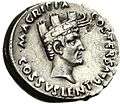Naval crown
 | ||||
| Part of a series on the | ||||
| Military of ancient Rome | ||||
|---|---|---|---|---|
| Structural history | ||||
|
||||
| Campaign history | ||||
| Technological history | ||||
|
||||
| Political history | ||||
|
|
||||
| Strategy and tactics | ||||
|
||||
|
| ||||
The Naval Crown (Latin: corona navalis) was a gold crown surmounted with small replicas of the prows of ships. It was a Roman military award, given to the first man who boarded an enemy ship during a naval engagement.
In heraldry a naval crown is mounted atop the shields of coats of arms of the naval vessels and other units belonging to some navies. It is made up of a circlet with the sails and sterns of ships alternating on top.
Gallery
 Example of a Naval Crown
Example of a Naval Crown Agrippa wearing the Naval crown, commemorating his role in the Battle of Actium.
Agrippa wearing the Naval crown, commemorating his role in the Battle of Actium. A naval crown in the coat of arms of the Brazilian Navy
A naval crown in the coat of arms of the Brazilian Navy A naval crown in the coat of arms of the British Indian Ocean Territory
A naval crown in the coat of arms of the British Indian Ocean Territory A naval crown in the coat of arms of the Chilean Navy
A naval crown in the coat of arms of the Chilean Navy A naval crown in the coat of arms of the Portuguese Marine Corps
A naval crown in the coat of arms of the Portuguese Marine Corps
See also
| Wikimedia Commons has media related to Naval crowns. |
References
- (in Spanish) Naval Crown definition. Libro de Armoría.
- Heraldic crowns, www.scottish-wedding-dreams.com
- Fox-Davies, Arthur Charles (1909) A Complete Guide to Heraldry, Chapter XXIII: Crest, Coronets and Chapeaux.
This article is issued from
Wikipedia.
The text is licensed under Creative Commons - Attribution - Sharealike.
Additional terms may apply for the media files.
